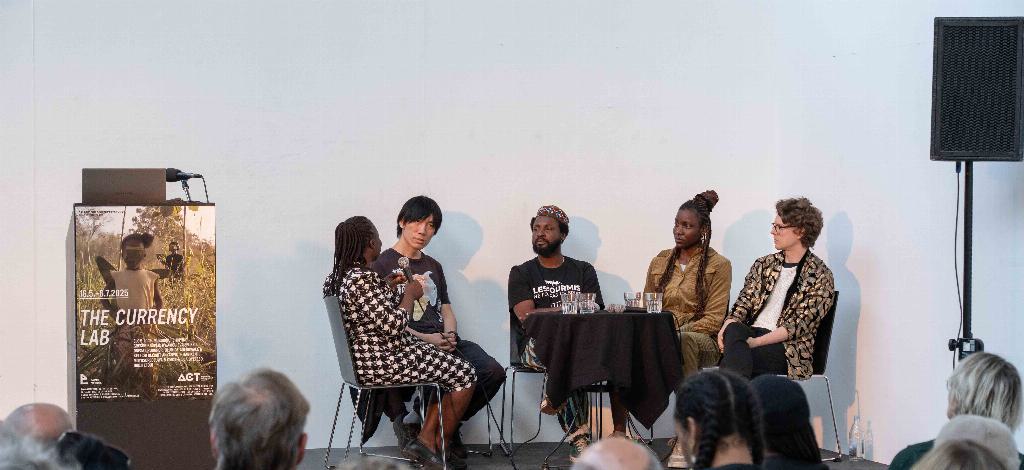- Bildhauerhalle
 Abosede Priscilla Ipadeola, Musquiqui Chihying, Elom 20ce, Kwamou Eva Feukeu und Gregor Kasper (links nach recht), Galerie für Gegenwartskunst, 2025 © Jennifer Rohrbacher
Abosede Priscilla Ipadeola, Musquiqui Chihying, Elom 20ce, Kwamou Eva Feukeu und Gregor Kasper (links nach recht), Galerie für Gegenwartskunst, 2025 © Jennifer Rohrbacher
Philosophical Reflections on African Diaspora Theories: Is Afrofuturism Utopian?
Vortrag und Gespräch mit Abosede Priscilla Ipadeola
Do 15.05.2025 | 19:15 Uhr | Bildhauerhalle
Im Rahmen der Vernissage The Currency-tɛknoʊmædʒɪkɛs Projekt
Anschließend Diskussion mit
Elom 20ce, Musquiqui Chihying, Gregor Kasper und Kwamou Eva Feukeu (Künstler:innen The Currency-tɛknoʊmædʒɪkɛs Projekt)
Veranstaltung in Englisch
Die Diaspora-Gemeinschaften halten ihre Verbindung zu ihren Heimatländern unter anderem dadurch aufrecht, dass sie Theorien und Ideologien entwickeln, die die Entwicklung dieser Regionen anregen oder fördern sollen. Es ist historisch belegt, dass der Grad oder das Tempo der Entwicklung eines Landes (oder Kontinents) eng mit der Qualität der Ideen und Entwürfe der Intellektuellen und Think Tanks verbunden ist. Afrikanische Diaspora-Gemeinschaften in der ganzen Welt haben sich aktiv an der Formulierung von Ideen beteiligt, die sich auf die Einheit, das Wirtschaftswachstum und die Entwicklung des Kontinents konzentrieren. So wurden beispielsweise Theorien wie Panafrikanismus, Negritude und Afrozentrismus von in der Diaspora lebenden Menschen afrikanischer Abstammung für den Kontinent vorgeschlagen. Auch der Afrofuturismus ist eine der neueren Theorien und Ideen in diesem Zusammenhang. Da sich die Entstehung des Afrofuturismus jedoch leicht von früheren Theorien der afrikanischen Diaspora unterscheidet, ist es unerlässlich, die Theorie im Hinblick auf ihren Pragmatismus kritisch zu untersuchen. Diese Diskussion konzentriert sich auf die Frage der Machbarkeit des Afrofuturismus und untersucht, ob er philosophisch fundiert ist oder eine reine Quixotische Idee darstellt.
Abosede Priscilla Ipadeola ist eine feministische afrikanische Philosophin. Derzeit ist sie Forschungsstipendiatin am Zentrum für Höhere Studien an der Universität Hildesheim in Deutschland. Ihre Forschungsinteressen umfassen afrikanische Philosophie (insbesondere feministische afrikanische Philosophie), globale politische Philosophie, schwarze feministische Studien, Erkenntnistheorie, Ethik und postkoloniale Studien. Sie hat als Dozentin und wissenschaftliche Mitarbeiterin an verschiedenen Universitäten und Forschungsinstituten gearbeitet, unter anderem an der University of Ibadan, Nigeria, der Katholischen Universität Eichstätt-Ingolstadt, Deutschland, der University of Leeds, Großbritannien, und dem Neuen Institut, Deutschland. Sie ist die Autorin von Feminist African Philosophy: Women and the Politics of Difference (Routledge, 2023). Ihre jüngste Veröffentlichung ist “Omoluabi Feminism: Political Leadership through an African Lens”, Research Handbook on Feminist Political Thought, M. Caputi & P. Moynagh (Hrsg.), (Edward Elgar, 2024). Sie ist die Einberuferin und erste Koordinatorin der League of African Women Philosophers (https://leagueofafricanwomenphilosophers.org/).
In Kooperation mit dem Africa Centre for Transregional Research der Universität Freiburg. Diese Veranstaltung ist zugleich Teil einer Programmreihe zum 5-jährigen Bestehen des ACT.

//ENG
Talk and Discussion with Abosede Priscilla Ipadeola
Thu 15 May 2025 | 7:15 PM | Sculpture Hall
Part of the opening of The Currency-tɛknoʊmædʒɪkɛs Projekt
Followed by a discussion with
Elom 20ce, Musquiqui Chihying, Gregor Kasper und Kwamou Eva Feukeu (artists of The Currency-tɛknoʊmædʒɪkɛs Projekt)
Event in English
One of the ways by which diasporic communities maintain their ties to their homelands is by developing theories and ideologies aimed at engendering or enhancing the development of those regions. Historical evidence indicates that the level or pace of a country’s (or continent’s) development is closely linked to the quality of ideas and blueprints put forth by its intellectuals and think tanks. African diasporic communities across the world have been active in formulating ideas focused on the continent’s unity, economic growth, and development. For example, theories such as Pan-Africanism, Negritude, and Afrocentrism have been proposed for the continent by individuals of African descent living in the diaspora. Afrofuturism has also been one of the more recent of such theories and ideas in this context. However, given that the emergence of Afrofuturism slightly differs from earlier African diasporic theories, it is imperative to critically examine the theory vis-à-vis its pragmatism. This discussion centers on the question of Afrofuturism’s feasibility, exploring whether it is philosophically sound or a mere quixotic idea.
Abosede Priscilla Ipadeola is a feminist African philosopher. Currently, she is a research fellow at the Center for Advanced Studies at the University of Hildesheim in Germany. Her research interests include African philosophy (especially, feminist African philosophy), global political philosophy, Black feminist studies, epistemology, ethics, and postcolonial studies. She has worked as a faculty member and academic researcher at different universities and research institutes, including the University of Ibadan, Nigeria, Katholische Universität, Eichstätt-Ingolstadt, Germany; University of Leeds, United Kingdom; The New Institute, Germany. She is the author of Feminist African Philosophy: Women and the Politics of Difference (Routledge, 2023). Her latest publication is “Omoluabi Feminism: Political Leadership through an African Lens”, Research Handbook on Feminist Political Thought, M. Caputi & P. Moynagh (Eds.), (Edward Elgar, 2024). She is the convener and first coordinator of the League of African Women Philosophers (https://leagueofafricanwomenphilosophers.org/).
In Cooperation with the Africa Centre for Transregional Research at the University of Freiburg. This event is also part of a programme series celebrating the 5th anniversary of the ACT.

Veranstaltungen // Events
Sa // Sat 17.5.2025 | 14 - 17 Uhr | Fotoecke, Bildhauerhalle
Workshop
mit / with Kwamou Eva Feukeu und / and Onesa Orughor
Do // Thur 22.5.2025 | 19 Uhr | Fotoecke, Bildhauerhalle
Performance Lecture
Jasmine Tutum: Nzam—Time and Spirit (Passages)
Di // Tues 24.6.2025 | 19 Uhr | Kammertheater
Short Story Reading
Bumni Agusto: The Spirtual Mechanics of Within
mit Einführung und Diskussion / with introduction and discussion
Öffentliche Führungen // Public Tours
Do // Thu 22.05.25, 18 Uhr
Do // Thu 5.06.25, 18 Uhr
Do // Thu 26.06.25, 18 Uhr
Öffnungszeiten // Opening hours
Do | Fr // Thu | Fri 17-20 Uhr
Sa // Sat 14-20 Uhr
So // Sun 14-18 Uhr